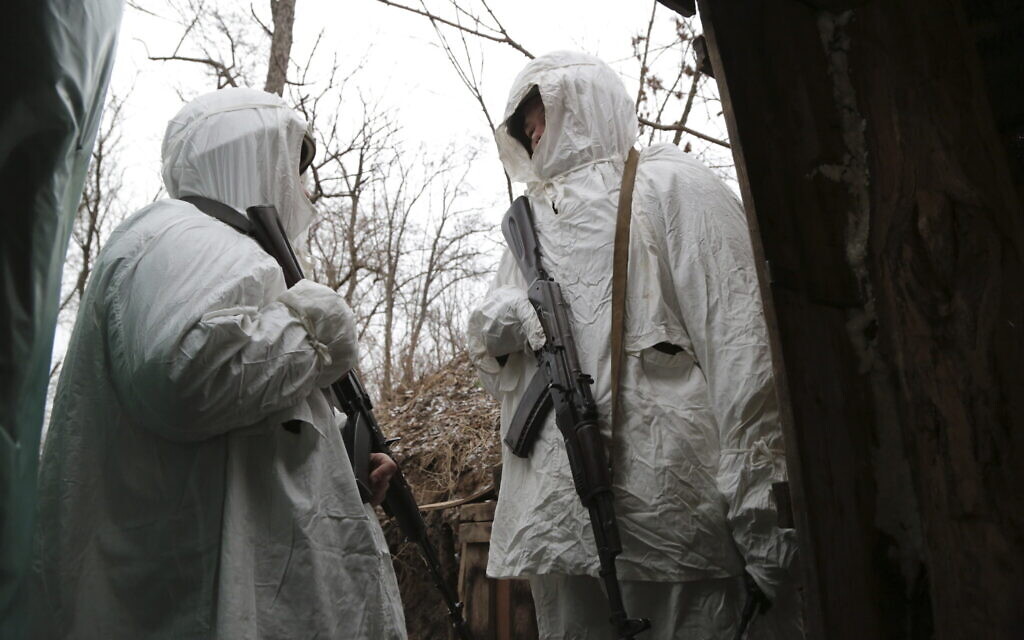Ukraine says it has evidence that Russia is behind a massive cyberattack
KYIV, Ukraine (AFP) – Ukraine said on Sunday it had “evidence” that Russia was behind a massive cyberattack that took down key government websites last week, while Microsoft warned that the hack could be much worse than previously thought.
Tensions are at their highest between Ukraine and Russia, which Kiev accuses of having massed troops on its border in anticipation of a possible invasion. Some analysts fear that the cyberattack could be the prelude to a military attack.
On Friday, Washington also accused Russia of sending saboteurs trained in explosives to stage an incident that could be the pretext to invade its pro-Western neighbor.
“All evidence points to Russia being behind the cyberattack,” Ukraine’s Ministry of Digital Transformation said in a statement.
“Moscow continues to wage hybrid warfare.”
The ministry urged Ukrainians not to panic, saying their personal information was protected.
The aim of the attack, he added, “is not only to intimidate society, but also to destabilize the situation in Ukraine, by interrupting the work of the public sector and crushing the confidence of Ukrainians in authorities”.
Kremlin spokesman Dmitry Peskov hosts Russian President Vladimir Putin’s annual press conference at the Manezh Exhibition Hall in central Moscow on December 23, 2021. (Natalia Kolesnikova/AFP)
The Kremlin has previously dismissed the allegations and said there was no evidence Russia was behind the attack.
“We have nothing to do with it. Russia has nothing to do with these cyberattacks,” President Vladimir Putin’s spokesman Dmitry Peskov told CNN.
“Ukrainians blame everything on Russia, even bad weather in their country,” he said in English.
Kyiv said on Friday evening that it had discovered preliminary clues that Russian security services may have been behind the cyberattack.
Ukraine’s SBU security service said attacks in the early hours of Friday targeted a total of 70 government websites.
The Foreign Ministry website for some time displayed a message in Ukrainian, Russian and Polish that read “be afraid and expect the worst”.
Hours after the breach, the security department said access to the most affected sites had been restored and the fallout was minimal.
Microsoft Disclaimer
But Microsoft warned on Sunday that the cyberattack could prove destructive and affect more organizations than initially feared.
The US software giant said it was continuing to analyze the malware and warned it could render government digital infrastructure inoperable.
“The malware, which is designed to look like ransomware but lacks a ransom-recovery mechanism, is intended to be destructive and designed to render targeted devices inoperable rather than to obtain a ransom,” Microsoft said in an article by blog.

In this undated photo released by the Ukrainian Foreign Ministry press service, the Ukrainian Foreign Ministry building is seen during snowfall in Kyiv, Ukraine. (Ukrainian Foreign Ministry Press Service via AP)
Microsoft said it has so far not identified a culprit, but warned that the number of organizations affected may prove to be larger than initially thought.
“These systems span multiple government, non-profit and information technology organizations, all based in Ukraine,” he said.
“We do not know the current stage of this attacker’s operational cycle or how many other victim organizations may exist in Ukraine or other geographic locations.”
“Totally Different Tracks”
Russia has amassed tanks, artillery and tens of thousands of troops near the Ukrainian border and demanded guarantees that its neighbor will never join NATO.
Senior Russian and Western officials held three rounds of talks in Geneva, Brussels and Vienna last week, but there was no breakthrough.
At the end of the week, Washington warned that Moscow could mount a false flag operation within weeks to precipitate an invasion.
On Sunday, NATO chief Jens Stoltenberg again called on Russia to defuse, adding that “we are ready to sit down and listen to their concerns as well.”
Asked what Ukraine could do to ward off the specter of war, he told Canadian broadcaster CBC: “We have to understand that the aggressor is Russia.
“To expect the victim of an assault to defuse is really to put it all in a weird and upside down way.”

NATO Secretary General Jens Stoltenberg attends a video conference of NATO Foreign Ministers on developments in Afghanistan, at NATO Headquarters in Brussels, August 20, 2021. (Francisco Seco/ Pool/ AFP)
Putin’s spokesman Peskov said there were “certain understandings between” Russia and the West.
“But in general, in principle, you can now say that you stay on different tracks, on totally different tracks. And that’s not good. It’s troubling,” he told CNN.
Ukrainian Foreign Minister Dmytro Kuleba said Kyiv and its Western partners were working on a broad “package to contain Russia” that would include “painful” new sanctions and steps to step up defense cooperation with Russia. ‘West.
“If Putin wants to know why neighbors are seeking to join NATO, he has only to look in the mirror,” he said in remarks released by the Foreign Ministry on Sunday.


Comments are closed.